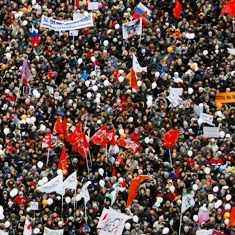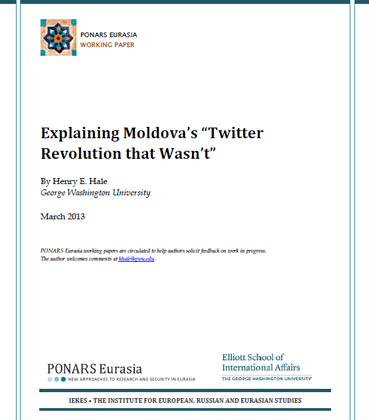In the aftermath of the public protests that accompanied the 2011–12 Russian electoral season, the topic of civil society in Russia returned to a level of prominence it had not had in Russia since the immediate aftermath of the period of mass protest that brought down the Soviet government in the late 1980s and the early 1990s. While many analysts had for years written about the unusually quiescent nature of Russian society, the emergence of mass public demonstrations against an entrenched political regime led some scholars to reevaluate their models of the political behavior of Russian citizens.
Most of the issue comprises the presentations made at a roundtable held by the journal Polis. The roundtable, titled “Quo Vadis? Prospects for Establishing Civil Society in Russia,” shows that there is no consensus on the role and functioning of civil society in present-day Russia, much less on its future prospects, among leading Russian academics. Some of the speakers see civil society as emerging from the organizations that have sought to protect and institutionalize Russians’ political rights over the last two decades. Others argue that these organizations are inherently political and therefore cannot be the basis for a true civil society. As one speaker notes, protests cannot be taken as a sign of the maturation of civil society. Supporters of this viewpoint look instead to various nonpolitical social organizations, including ones focused on establishing organizations that help Russian citizens achieve their material, spiritual, and social needs.
The speakers also disagree on the state’s role in developing civil society in Russia. Supporters of the political point of view primarily see the state as an opponent of efforts to build Russian civil society. Others argue that in present-day Russia, civil society cannot be developed without state involvement. While there are many nuances to the argument, the critical disagreement can be summarized in the debate over whether civil society can function successfully only if social actors and the state cooperate in its development or, on the contrary, if its development requires society to battle against a largely authoritarian state to create space for public political activity. The roundtable participants do not resolve this dispute, which also remains at the heart of divisions among different political currents within the Russian Federation.
In “Mass Protests in the Context of the Russian Power Regime,” Anton Oleinik interprets the mass protests in Russia in late 2011 and early 2012 as a reaction to the prevalence of a special model of power relationships in Russia. He argues that dissatisfaction with the absence of feedback in relations between the state and society played a critical role in spawning the protests, utilizing survey data that shows that this reason was given by more than half of all protest participants as a cause of their participation in a critical December 2011 demonstration, while the more specific reason of indignation about voter fraud (also an indicator of a lack of equitable relations between state and society) was cited by almost three-quarters of respondents.
Oleinik discusses scenarios in which the mass protests are a first step toward the transition from the existing equilibrium of the Russian power regime to a new democratic equilibrium regime, placing an emphasis on two tasks. The first is the need to reform municipal and regional governance, which could act as a school for the next generation of officials, who could transfer their experience to the central level as they rise in the ranks. The second is the need to democratize the functioning of universities, especially those that train members of the future governing elite. As with local administration, the educational institutions could act as training grounds for the next generation of government officials, inculcating democratic values that they would in turn enshrine in state institutions during their subsequent careers.
Since these articles were published in mid-2012, the Russian protest movement has visibly lost steam. Vladimir Putin’s regime not only seems strongly entrenched but has initiated a crackdown on independent nongovernmental organizations that has made it increasingly difficult for societal organizations seeking to build civil society to function. As a result, it may be that in the short term, collaboration with the state or withdrawal from political engagement may be the only ways for independent civil society organizations to survive. The longer term offers a much wider array of possibilities, as the gradual emergence of a true middle class in Russia’s larger cities augurs well for the possibility of the gradual development of preconditions for the development of a civic culture in Russia that may lead Russian citizens to create boundaries for state power.
See: Russian Politics and Law, Volume 51 Number 2/March-April 2013 available at mesharpe.metapress.com at http://mesharpe.metapress.com/link.asp?id=U3W2355N2437.
Dmitry Gorenburg is a Senior Analyst at CNA blogging for PONARS Eurasia on military and security affairs in Russia and Eurasia. This comment is also available on Russian Military Reform.










